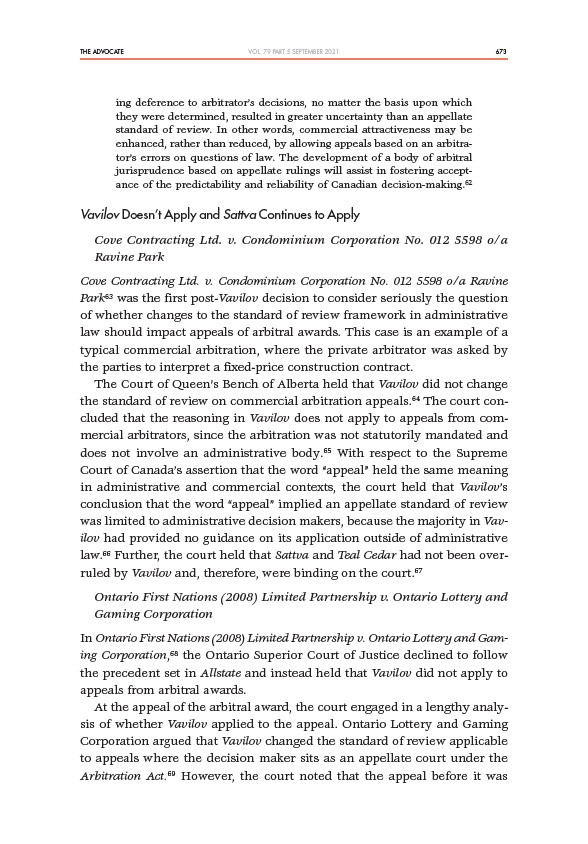
THE ADVOCATE 673
VOL. 79 PART 5 SEPTEMBER 2021
ing deference to arbitrator’s decisions, no matter the basis upon which
they were determined, resulted in greater uncertainty than an appellate
standard of review. In other words, commercial attractiveness may be
enhanced, rather than reduced, by allowing appeals based on an arbitrator’s
errors on questions of law. The development of a body of arbitral
jurisprudence based on appellate rulings will assist in fostering acceptance
of the predictability and reliability of Canadian decision-making.62
Vavilov Doesn’t Apply and Sattva Continues to Apply
Cove Contracting Ltd. v. Condominium Corporation No. 012 5598 o/a
Ravine Park
Cove Contracting Ltd. v. Condominium Corporation No. 012 5598 o/a Ravine
Park63 was the first post-Vavilov decision to consider seriously the question
of whether changes to the standard of review framework in administrative
law should impact appeals of arbitral awards. This case is an example of a
typical commercial arbitration, where the private arbitrator was asked by
the parties to interpret a fixed-price construction contract.
The Court of Queen’s Bench of Alberta held that Vavilov did not change
the standard of review on commercial arbitration appeals.64 The court concluded
that the reasoning in Vavilov does not apply to appeals from commercial
arbitrators, since the arbitration was not statutorily mandated and
does not involve an administrative body.65 With respect to the Supreme
Court of Canada’s assertion that the word “appeal” held the same meaning
in administrative and commercial contexts, the court held that Vavilov’s
conclusion that the word “appeal” implied an appellate standard of review
was limited to administrative decision makers, because the majority in Vavilov
had provided no guidance on its application outside of administrative
law.66 Further, the court held that Sattva and Teal Cedar had not been overruled
by Vavilov and, therefore, were binding on the court.67
Ontario First Nations (2008) Limited Partnership v. Ontario Lottery and
Gaming Corporation
In Ontario First Nations (2008) Limited Partnership v. Ontario Lottery and Gaming
Corporation,68 the Ontario Superior Court of Justice declined to follow
the precedent set in Allstate and instead held that Vavilov did not apply to
appeals from arbitral awards.
At the appeal of the arbitral award, the court engaged in a lengthy analysis
of whether Vavilov applied to the appeal. Ontario Lottery and Gaming
Corporation argued that Vavilov changed the standard of review applicable
to appeals where the decision maker sits as an appellate court under the
Arbitration Act.69 However, the court noted that the appeal before it was